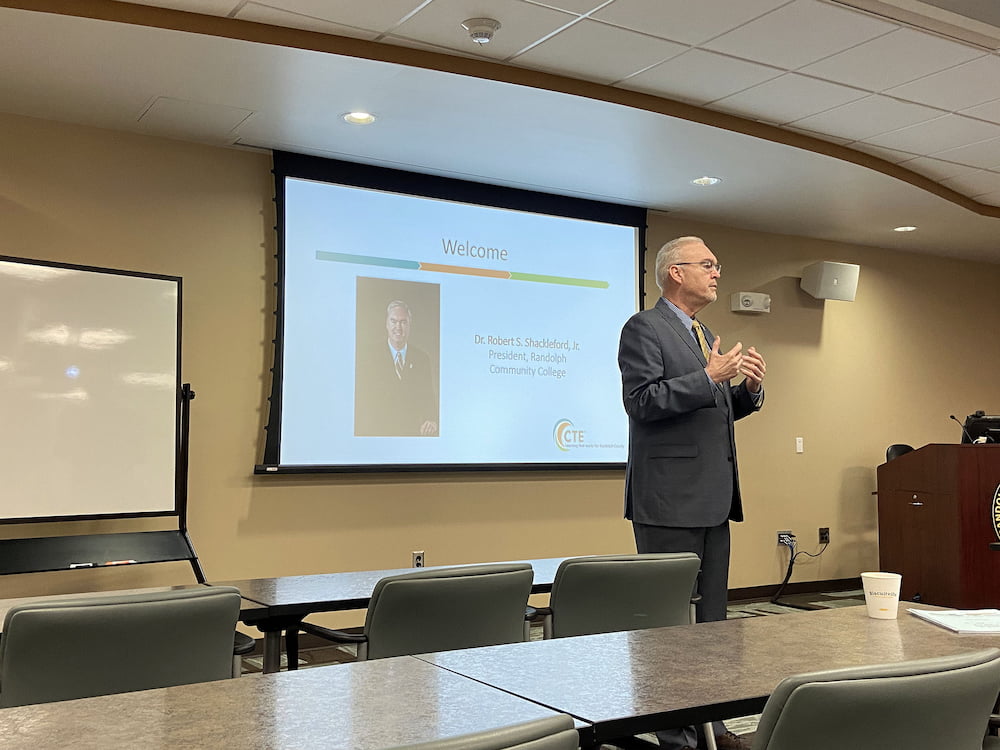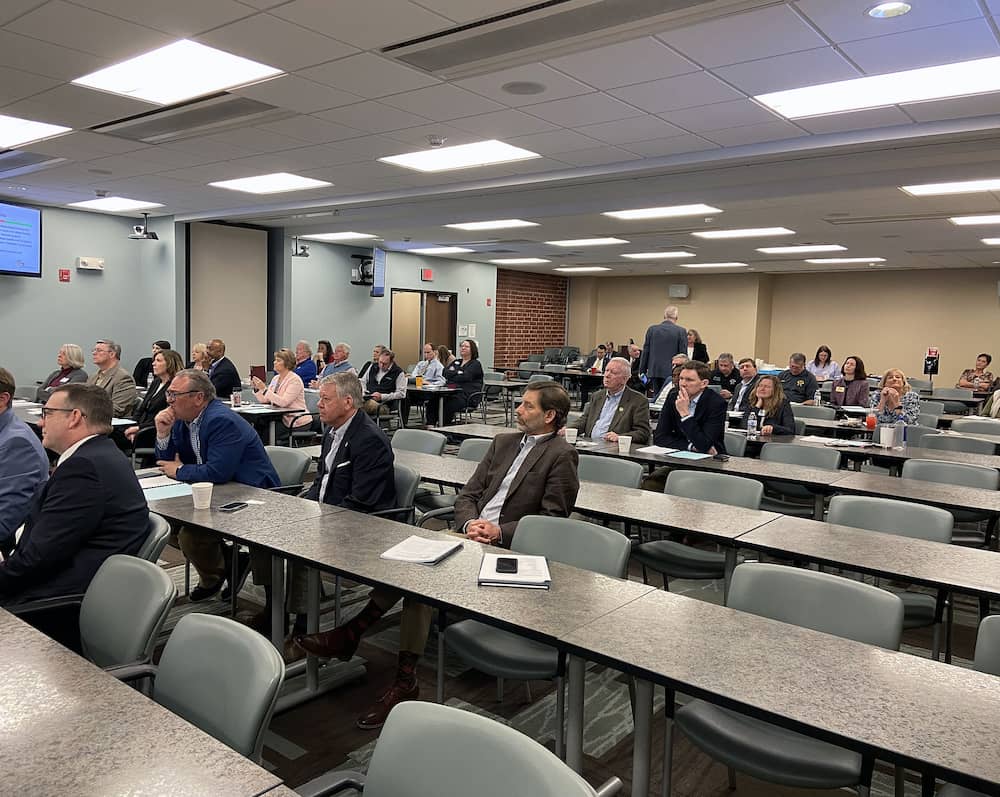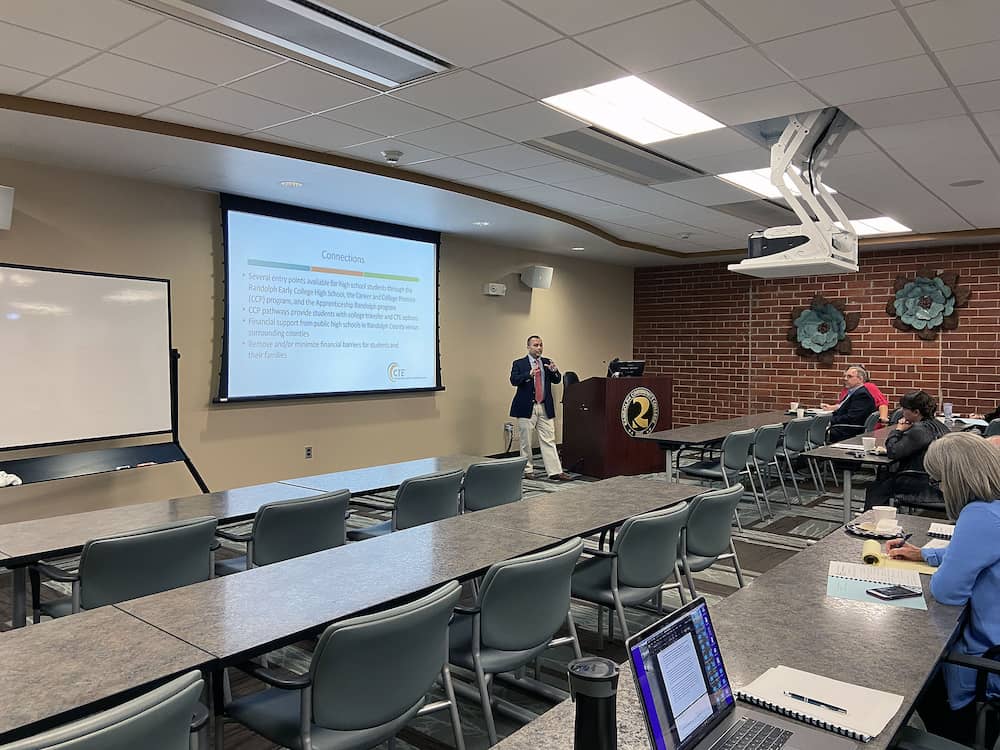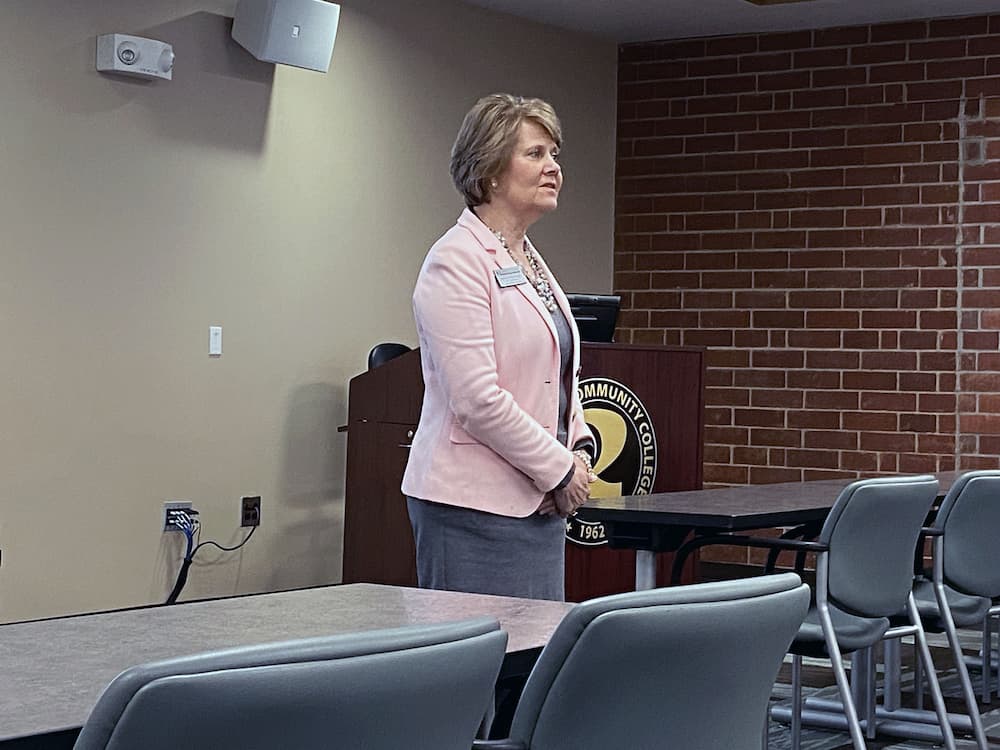RCC hosts State of the County

Randolph Community College President Dr. Robert S. Shackleford Jr. opens the State of the County on Tuesday, March 29, in the JB & Claire Davis Corporate Training Center on the Asheboro Campus.
Members of the Randolph County community gathered in Randolph Community College’s JB & Claire Davis Corporate Training Center on Tuesday, March 29, for the “State of the County” — a discussion of the current and future workforce needs and the educational pipeline of Randolph County.
RCC President Dr. Robert S. Shackleford Jr. opened the event, welcoming those in attendance.
“Every year, we identify what our needs are in the workforce in our community because we can’t meet those needs if we don’t identify them,” he said. “As I look around this room and see people from different walks of life and different agencies — we have an advantage in that we have a community that is not about schisms and competition and silos. We have a community that’s about, ‘Let’s be friends. Let’s work together. Let’s be partners. Let’s be collaborators and together we can make our community better.”
RCC President Dr. Robert S. Shackleford Jr. opened the event, welcoming those in attendance.
“Every year, we identify what our needs are in the workforce in our community because we can’t meet those needs if we don’t identify them,” he said. “As I look around this room and see people from different walks of life and different agencies — we have an advantage in that we have a community that is not about schisms and competition and silos. We have a community that’s about, ‘Let’s be friends. Let’s work together. Let’s be partners. Let’s be collaborators and together we can make our community better.”

RCC Dean of Curriculum Programs Melinda Eudy then gave an overview of the Perkins V — The Strengthening Career and Technical Education (CTE) for the 21st Century Act, which allows school districts to use federal funds to provide students career exploration and development activities in the middle school and for comprehensive guidance and academic counseling in the upper grades. Eudy used the example of RCC’s Agribusiness Technology program, which used the funds to renovate the greenhouse and begin the construction of an arboretum on campus.
Kevin Franklin, President of the Randolph County Economic Development Corporation, pointed out the 3.5 percent unemployment rate for the county, but noted that the statewide labor force participation rate is just 60 percent.
“What that means is about 40 percent of the potentially eligible workforce is not working and not looking for a job right now,” he said. “To me, that’s a little bit scary because there are lots and lots of jobs available and businesses are having a struggle to fill those positions. What I really believe is that the next generation of employees — and many of those positions that we have both now and in the future — are going to come up through our school systems and through RCC. It’s incredibly important that we all recognize the opportunity to share with those young people about career opportunities in the county and to get them ready to fill those jobs that are in the county.”
Franklin emailed a survey to local businesses, asking not only about job openings, but also what is needed in the workforce. He said that, among those necessary skills, were employability skills, critical thinking, communication skills, budgeting, interview skills, how to complete and sign forms and applications, and a general knowledge of basic hand tools.
Kevin Franklin, President of the Randolph County Economic Development Corporation, pointed out the 3.5 percent unemployment rate for the county, but noted that the statewide labor force participation rate is just 60 percent.
“What that means is about 40 percent of the potentially eligible workforce is not working and not looking for a job right now,” he said. “To me, that’s a little bit scary because there are lots and lots of jobs available and businesses are having a struggle to fill those positions. What I really believe is that the next generation of employees — and many of those positions that we have both now and in the future — are going to come up through our school systems and through RCC. It’s incredibly important that we all recognize the opportunity to share with those young people about career opportunities in the county and to get them ready to fill those jobs that are in the county.”
Franklin emailed a survey to local businesses, asking not only about job openings, but also what is needed in the workforce. He said that, among those necessary skills, were employability skills, critical thinking, communication skills, budgeting, interview skills, how to complete and sign forms and applications, and a general knowledge of basic hand tools.

Chairman of the Randolph County Commissioners Darrell Frye then spoke, noting that all of the teaching and training requires funding for schools.
“We’re living in a land of opportunities — opportunities this county hasn’t ever had,” he said, citing Toyota coming to the Randolph Megasite. “It’s necessary that we come together. Our existing industries are continuing to grow and a skilled workforce has enabled them to grow. Over the weekend, I was catching up on some of my reading, and there was a report issued of the top 10 communities in North Carolina. Number two on that list was the city of Trinity and number four on that list was the city of Archdale. People are wanting to come here to live and grow.”
Julie Fowler, Director of Operations & Finance Operator of the Asheboro/Randolph Chamber, said the Chamber has listened to business leaders about the difficulties of finding qualified and committed employees even before the COVID pandemic.
“The important thing is getting these high school students to see past their post-secondary training and education,” she said, “and how we train and retrain our adult populations for the skilled employment opportunities that we have in our community. And more importantly, how do we motivate people to show up after over two years of living in a remote or hybrid process?”
Tammy Wall, Workforce Development Director of the Regional Partnership Workforce Development Board (RPWDB), which represents Alamance, Moore, Montgomery, Orange, and Randolph counties, spoke next. Wall went through all of the services the RPWDB provides as it collaborates with businesses, educational and training institutions, community agencies, and local regional and state government representatives.
“Our work reaches adults seeking more meaningful careers, dislocated workers aiming to regain employment, and youth focused on getting the right start in life,” she said.
“We’re living in a land of opportunities — opportunities this county hasn’t ever had,” he said, citing Toyota coming to the Randolph Megasite. “It’s necessary that we come together. Our existing industries are continuing to grow and a skilled workforce has enabled them to grow. Over the weekend, I was catching up on some of my reading, and there was a report issued of the top 10 communities in North Carolina. Number two on that list was the city of Trinity and number four on that list was the city of Archdale. People are wanting to come here to live and grow.”
Julie Fowler, Director of Operations & Finance Operator of the Asheboro/Randolph Chamber, said the Chamber has listened to business leaders about the difficulties of finding qualified and committed employees even before the COVID pandemic.
“The important thing is getting these high school students to see past their post-secondary training and education,” she said, “and how we train and retrain our adult populations for the skilled employment opportunities that we have in our community. And more importantly, how do we motivate people to show up after over two years of living in a remote or hybrid process?”
Tammy Wall, Workforce Development Director of the Regional Partnership Workforce Development Board (RPWDB), which represents Alamance, Moore, Montgomery, Orange, and Randolph counties, spoke next. Wall went through all of the services the RPWDB provides as it collaborates with businesses, educational and training institutions, community agencies, and local regional and state government representatives.
“Our work reaches adults seeking more meaningful careers, dislocated workers aiming to regain employment, and youth focused on getting the right start in life,” she said.

Asheboro City Schools (ACS) Director of CTE Sarah Beth Robbins and Randolph County School Systems (RCSS) CTE Director David Cross showed the attendees what their respective systems are doing to promote CTE and what their goals are for the future. ACS has 1,767 unduplicated enrollments in CTE with a 99.27 percent graduation rate for CTE concentrators, while the RCSS has 6,055 unduplicated and a 94.7 graduation rate.
“We want our students to see that value and find employment and come back here to contribute to our communities,” Robbins said.
“What’s special in our county is relationships,” Cross said. “Partnerships make it all possible.”
Dr. Isaí Robledo, RCC Director of Educational Partnerships & Initiatives, presented the opportunities for high school students at RCC, including Career and College Promise where students can go to college while in high school tuition-free. He also spoke about the Randolph Early College High School on RCC’s campus that students can attend while earning an associate degree. Robledo then talked about Apprenticeship Randolph where students attend RCC for free while earning a wage and on-the-job-training, and college transfer.
“I have one of the best jobs at the College; I get to work directly with our high school students to present them with the opportunities available to them before they even graduate from high school,” he said. “Something that is very unique about this community is there is a lot of financial support. You have tuition covered, fees covered, and the local school systems are paying for textbooks for high school students — that essentially removes the biggest barriers to why students say they can’t or shouldn’t go to college.”
Eudy and RCC Dean of Workforce Development & Continuing Education Randy Gunter discussed the short-term and long-term training RCC provides along with the current data for for-credit CTE programs and non-credit CTE programs at the College. RCC Director of Apprenticeships & Pathways Stacey Miller then led a question-and-answer session.
RCC Vice President for Instructional Services Suzanne Rohrbaugh closed the event.
“It’s exciting to look at what the future of Randolph County holds,” she said. “It is extremely valuable to us to have your partnership — it always comes back to relationships. The future is bright.”
“We want our students to see that value and find employment and come back here to contribute to our communities,” Robbins said.
“What’s special in our county is relationships,” Cross said. “Partnerships make it all possible.”
Dr. Isaí Robledo, RCC Director of Educational Partnerships & Initiatives, presented the opportunities for high school students at RCC, including Career and College Promise where students can go to college while in high school tuition-free. He also spoke about the Randolph Early College High School on RCC’s campus that students can attend while earning an associate degree. Robledo then talked about Apprenticeship Randolph where students attend RCC for free while earning a wage and on-the-job-training, and college transfer.
“I have one of the best jobs at the College; I get to work directly with our high school students to present them with the opportunities available to them before they even graduate from high school,” he said. “Something that is very unique about this community is there is a lot of financial support. You have tuition covered, fees covered, and the local school systems are paying for textbooks for high school students — that essentially removes the biggest barriers to why students say they can’t or shouldn’t go to college.”
Eudy and RCC Dean of Workforce Development & Continuing Education Randy Gunter discussed the short-term and long-term training RCC provides along with the current data for for-credit CTE programs and non-credit CTE programs at the College. RCC Director of Apprenticeships & Pathways Stacey Miller then led a question-and-answer session.
RCC Vice President for Instructional Services Suzanne Rohrbaugh closed the event.
“It’s exciting to look at what the future of Randolph County holds,” she said. “It is extremely valuable to us to have your partnership — it always comes back to relationships. The future is bright.”
